HÂş» achieved a few firsts of note during its annual Accessibility Week campaign this year.
On Monday (Nov.27), the university held its first-ever launch event for the week-long awareness campaign that's now in its second year. The President's Office, Human Resources, and Student Affairs co-sponsored the gathering, which showcased perspectives on accessibility and ableism from students, senior leaders, and the community.
That event also included another first: the raising of the International Day for Persons with Disabilities flag on Studley Campus in Halifax and on Dal's campus in Truro.Ìı
Lastly, the university released its first progress report on the university's official Accessibility Plan â a document released last year that lays out Dal's path to meeting and exceeding Nova Scotia's accessibility requirements by the 2030 target.
Quenta Adams and Chris Hattie, co-chairs of HÂş»'s Accessibility Advisory Committee, provided snapshots from the report at the launch with updates in six key areas of focus in Dal's plan: Built Environment; Teaching, Learning, and Research; Goods and Services; Information and Communication; Transportation, and Employment.
"You'll see that [progress is] happening across Faculties and administrative units with students, staff and faculty," said Adams, Dal's assistant vice provost of student engagement and success, at the event. "It really demonstrates our obligation and emphasizes that accessibility is everyone's responsibility. It doesn't just sit with a particular department or unit. It sits with all of us as individuals.â
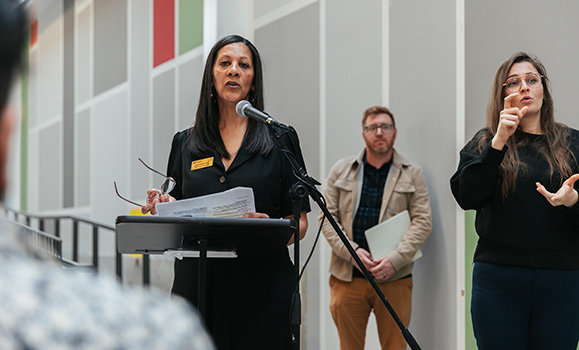
Adams, left, with Chris Hattie, Dal's director of employee experience, centre, and Sydney Pakosh, American Sign Language/English interpreter at the event.Ìı
For specific progress points in each area, see the full report:Ìı
Data included in the report shows 2,040 students met with a Student Access Advisor over the past year, that there was a 16 per cent increase in the number of accommodated exams written through the Student Accessibility Centre last year, and that more that more than 1,000 accessibility barriers have been removed between May 2018 and March 2023 as tracked in the universityâs accessibility audit.
First-voice perspectives
The addition of a launch event to the Accessibility Week campaign provided another opportunity for Dal to centre first-person voices as part of its awareness and capacity building efforts.
Tereigh Ewert, co-chair of HÂş»âs (dis)Ability Caucus and an educational developer with the Centre for Learning and Teaching, brought a message of ally-ship to the launch. She spoke about the tendency to treat peopleâs disabilities as the problem when the real issues are the barriers disabled individuals face in having their needs met.
"Every time we hear the term âdisability issuesâ, really the problem, the issue, is with ableism,â she said. Ableism is discrimination that favours people without disabilities.
She said campaigns such as Accessibility Week â filled with opportunities for professional development, skills building, and sharing experiences â are one way to help combat the old-fashioned attitudes, stigmas and lack of awareness that perpetuate ableism.
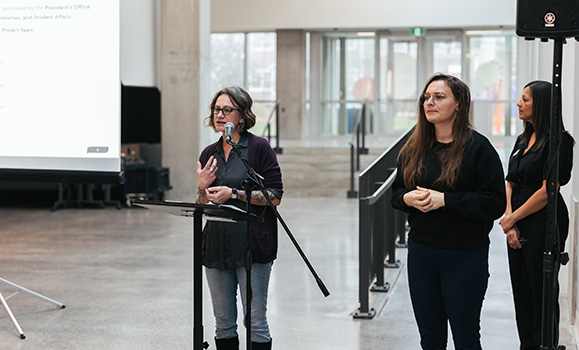
Tereigh Ewert, above left.
Watch:Ìı
Eshan Arora, a fourth-year Dal student and community leader, shared thoughts on what accessibility means to students and how it intertwines with their sense of belonging in university. Reflecting the diversity of studentsâ unique needs in university policies, teaching methods, and culture, is key, he said.
"Let's work toward the future of the university where the pressures of academic life don't overshadow our need for belonging and support and where each of us can confidently say, 'I thrive here.'"
Watch:
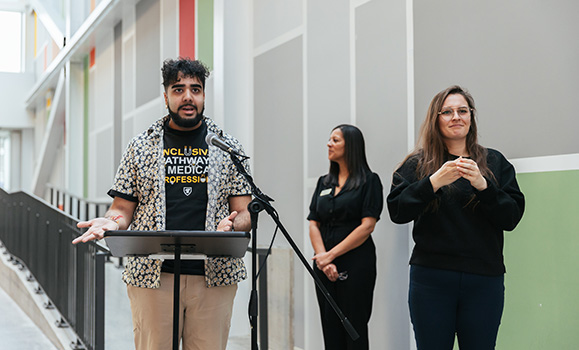
Student Eshan Arora speaks.
Attendees at the launch â both in person and online â also got to hear three spoken-word pieces from Laura Burke, a Halifax-based counsellor and creative arts therapist with a unique poetic voice.
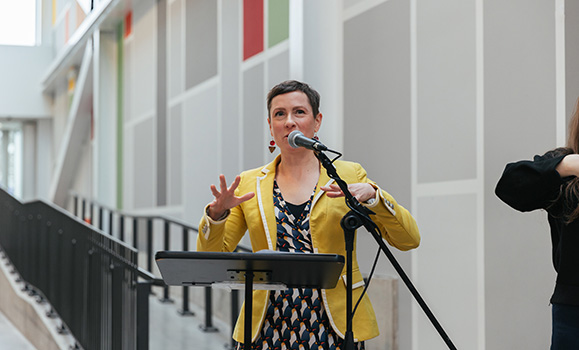
Laura Burke.
Watch:Ìı
For Frank Harvey, Dalâs provost and vice-president, academic, the launch event was a chance to showcase just how integral inclusivity and accessibility are to Dalâs strategic planning.
"We will continue to strive to exceed the core requirements set out by the [provincial] legislation, guided by the following shared values and principles: a diverse and inclusive university enhances how we teach, how we learn, undertake research, work, and engage inside and outside HÂş»; an accessible environment benefits everyone and removing barriers is key for equitable access to education, research, employment and services; and foundational to our plans is collaboration on values-based approaches that prioritize first voices and upholding accessibility as a fundamental human right.â
Watch:Ìı
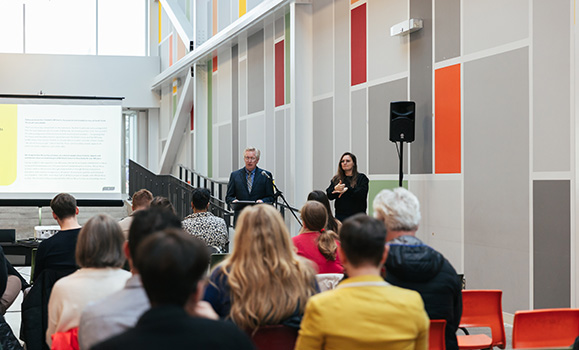
Frank Harvey, Dal's provost and vice-president, academic.

